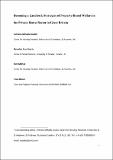Files in this item
Becoming a landlord : strategies of property-based welfare in the private rental sector in Great Britain
Item metadata
| dc.contributor.author | Soaita, Adriana Mihaela | |
| dc.contributor.author | Searle, Beverley Ann | |
| dc.contributor.author | McKee, Kim | |
| dc.contributor.author | Moore, Tom | |
| dc.date.accessioned | 2018-03-27T23:33:48Z | |
| dc.date.available | 2018-03-27T23:33:48Z | |
| dc.date.issued | 2017-05-04 | |
| dc.identifier | 244483265 | |
| dc.identifier | 2301fe25-cf7a-445a-b1bf-252dc63a4e75 | |
| dc.identifier | 84988709937 | |
| dc.identifier | 000400854900004 | |
| dc.identifier.citation | Soaita , A M , Searle , B A , McKee , K & Moore , T 2017 , ' Becoming a landlord : strategies of property-based welfare in the private rental sector in Great Britain ' , Housing Studies , vol. 32 , no. 5 , pp. 613-637 . https://doi.org/10.1080/02673037.2016.1228855 | en |
| dc.identifier.issn | 0267-3037 | |
| dc.identifier.other | ORCID: /0000-0002-3611-569X/work/32192373 | |
| dc.identifier.uri | https://hdl.handle.net/10023/13034 | |
| dc.description | This work was supported by the Leverhulme Trust [grant number RP2011-IJ-024]. | en |
| dc.description.abstract | Ongoing neoliberal policies have realigned the links between housing and welfare, positioning residential property investment––commonly through homeownership and exceptionally also through landlordism––at the core of households’ asset-building strategies. Nonetheless the private rented sector (PRS) has been commonly portrayed as a tenure option for tenants rather than a welfare strategy for landlords. Drawing on qualitative interviews with landlords across Great Britain, we explore landlords’ different motivations in engaging in landlordism; and the ways in which their property-based welfare strategies are shaped by the particular intersection of individual socioeconomic and life-course circumstances, and the broader socioeconomic and financial environment. By employing a constructionist grounded approach to research, our study contributes to a more nuanced understanding of the different ways that asset-based welfare strategies operate within the PRS. We draw attention to an understudied nexus between homeownership and landlordism which we argue represents a promising route for future research. | |
| dc.format.extent | 25 | |
| dc.format.extent | 500260 | |
| dc.language.iso | eng | |
| dc.relation.ispartof | Housing Studies | en |
| dc.subject | Private rental sector | en |
| dc.subject | Landlords | en |
| dc.subject | Asset based welfare | en |
| dc.subject | Property | en |
| dc.subject | Inequality | en |
| dc.subject | NDAS | en |
| dc.title | Becoming a landlord : strategies of property-based welfare in the private rental sector in Great Britain | en |
| dc.type | Journal article | en |
| dc.contributor.sponsor | The Leverhulme Trust | en |
| dc.contributor.institution | University of St Andrews. Geography & Sustainable Development | en |
| dc.contributor.institution | University of St Andrews. Centre for Minorities Research (CMR) | en |
| dc.identifier.doi | 10.1080/02673037.2016.1228855 | |
| dc.description.status | Peer reviewed | en |
| dc.date.embargoedUntil | 2018-03-27 | |
| dc.identifier.grantnumber | RP2011-IJ-024 | en |
This item appears in the following Collection(s)
Items in the St Andrews Research Repository are protected by copyright, with all rights reserved, unless otherwise indicated.

